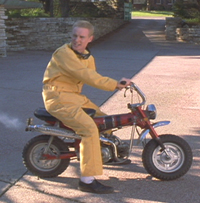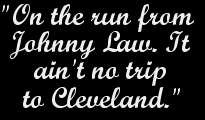|  |  |
Bottle
Rocket (1996)
Director:
Wes Anderson
Writers: Wes Anderson and Owen Wilson
Producers:
Cynthia Hargrave, Polly Platt, L.M. Kit Carson (co-producer), Ray
Zimmerman (co-producer), Barbara Boyle (executive), James L. Brooks
(executive), Richard Sakai (executive), Michael taylor (executive),
Andrew Wilson (associate), Michael Lang (associate)
Unlike
many
writer-directors of his generation, Wes Anderson does not view his
characters from some distant Olympus of irony. He stands beside them --
or rather, just behind them -- cheering them on as they chase their
miniaturist renditions of the American Dream. The characters who
inhabit Anderson's cinematic universe, a Middle West of the
Imagination, embody both sides of William Carlos Williams' famous edict
that the pure products of America go crazy, being, for the most part,
both purely American and slightly crazy. Though some might label his
people losers, or even invoke that generational curse, slackers, they
are in fact ambitious and motivated overreachers, misguided though
their energies occasionally are.
Todd Solondz may be
the new
leader of the arch-irony cult, and therefore the filmmaker seemingly
most at odds with Anderson's lighter, nonsatiric touch, but he at least
uses his distance to create a shifting matrix of uncertain sympathy and
identification. It's filmmakers like Gregg Araki or that ironist
old-timer Hal Hartley to whom Anderson is most in opposition. They use
an ironic stance to establish their superiority over characters and
audience alike. Within their overly referential worlds, the viewer is
always left to play catch-up, attempting not only to spot the reference
but also digest its "meaning," while characters are reduced to ciphers
or signs. In a climate where coolness reigns and nothing matters, the
toughest stance to take is one of engagement and empathy. Anderson
seems to have accepted the challenge.
Anderson
himself seems not
so removed from those he portrays, as if his deep affection and
sympathy for his characters stems from a glimmer of self-recognition.
Both of his films to date, 1996's Bottle Rocket and the new Rushmore,
were shot in areas of his native Texas with which he is intimately
familiar, and apparently autobiographical elements are strewn
throughout. Rushmore, named after the small, fictitious private school
in which it is mostly set, was filmed at the alma mater where Anderson
languished through his high school years. Still, this is not to imply
that his films are psychodramatic extensions of a therapist's couch.
Each is an entertainment of the highest order, with a wit, verve, and
sincerity largely absent from the contemporary youth picture.
Young
Wes, like Rushmore's Max Fischer (Jason Schwartzman), would, in
exchange for good behavior, be permitted to put on plays for his
classmates -- hyper-energized, TV-derived scenarios such as The Five
Mazeratis, an Autobahn drama, or a reenactment of the Battle of the
Alamo. Anderson also made short Super-8 films -- spy movie knockoffs or
the new installments in the ongoing adventures of Indiana Jones. After
a brief phase as a self-styled "literary type," he majored in
philosophy at the University of Texas at Austin but wanted to return to
moviemaking. Eschewing film school, he got involved with local cable
access production in both Austin and his native Houston. He had by this
time met up with Owen Wilson, his writing partner, and they set about
writing what would become Bottle Rocket, the script Anderson claims at
one point ambled its way up to around 300 pages. They began shooting
with the intention of filming their way through the script in
installments, but ran out of money after completing a modest 13-minute
short. This prototype Bottle Rocket and their epic-length script made
its way up the moviemaking foodchain until it reached producer-director
James L. Brooks, who helped steer more money their way than they had
ever imagined necessary for their project.
It's easy
to see how
the short functioned as a small part of a larger whole, and although
it's self-sufficient, it is most interesting in relation to its more
fully realized feature companion-piece. For example, while the short
begins with two of its characters riffing on Huggy Bear and a
particular episode of Starsky and Hutch, this type of pop culture
dialogue -- a fixture of Nineties hip cinema -- is conspicuously absent
from Anderson's feature. In its place is an obsessive, endless patter
of therapy-inflected self-analysis, aimlessly revolving in circles. Not
for nothing does the bookstore robbery that serves as centerpiece of
the short remain unseen; instead Dignan (Owen Wilson) and Anthony
(Owen's brother, Luke Wilson) recount the details to their getaway
driver Bob (Robert Musgrave, who, like the Wilsons, reprised his role
in the feature). The action itself is important only in that it gives
them something new to talk about, creating a springboard for further
attempts at personal insight. If both of his films seem to be about
people spinning their wheels, Anderson is interested less in the lack
of forward movement than in the kinetic excitement of energy displaced
-- life as a colorful pinwheel or, as the title metaphor points to, a
beautifully glowing, albeit temporary, roadside firework.
Anthony
and Dignan will surely someday be recognized as Nineties archetypes;
restless and uncertain about their current life status, they are
perpetually in transition. Their essential dilemma is one that faces a
lot of contemporary middle-class Americans standing on the verge of
full-fledged postcollegiate adulthood; finding the prospects somewhat
terrifying, they yearn obsessively to regress into a childhood freedom
that is obviously unobtainable. Early in what we might call Bottle
Rocket: The Movie, Anthony visits his little sister, Grace, at her
private school. She speaks to him with an adult honesty he later calls
"cynical," yet she has a far clearer perspective on her brother and
Dignan than they ever have on themselves. Anthony, fresh from a
voluntary stay at a mental hospital for "exhaustion" (Grace: "You
haven't worked a day in your life, how could you be exhausted?"), seeks
grace in Grace, a sense of innocence and purity he has lost in himself
and in the world he sees.
Shortly after, while
waiting for Bob
(whose only qualification for their would-be criminal crew, besides his
self-styled air of mystery, is his beat-up, hand-me-down Mercedes),
Anthony discusses his recent hospitalization with a sorority-girl
friend of Bob's older brother, Future Man (another Wilson brother,
Andrew). He explains how, when asked by his then-girlfriend whether he
wanted to water-ski or lay out, "I realized not only did I not want to
answer that question, but I never wanted to answer another watersports
question, or see any of these people again for the rest of my life."
The honesty of his response pinpoints a sense of guilt and anxiety
about an inherited life of privilege and leisure, and its seeming
inescapability. This is the closest Anderson & Co. ever come to
the
suburbia-as-soul-crushing,-mind-numbing-hell sentiments espoused by
their filmmaking contemporaries. The overall feeling of this moment is
one of melancholy rather than anger, resentment, or mockery -- a
wistful schoolboy sadness that is reflected in the eyes of the girl,
who can muster no reply but "You're really complicated, aren't you?"
Her tone bespeaks a certain wonderment: is Anthony one of those sexy,
bohemian boys she read about in a magazine once? He smiles slightly,
and the tone shifts back to one of polite, guarded optimism as he
shrugs and responds, "I try not to be."
Their
little-league Wild
Bunch complete, Dignan, Anthony, and Bob set about planning their
"practice job," a small robbery meant to capture the attention of local
crime boss Mr. Henry (James Caan). The job will be among the first
steps in Dignan's 75-year plan in wealth and happiness, which he has
conveniently outlined for Anthony in a spiral notebook with Magic
Marker. Now we finally get to see the boys in action; with Breathe-Rite
strips for disguises ("What are you putting that tape on your nose
for?" "Exactly."), they rob a bookstore. The heist, if it can be
thought of as such, is a success, and they set off on the run, settling
in at a roadside motel where Anthony falls for their pretty young
Paraguayan housekeeper.
Though the trappings of
gangster cool
are played off against the trio's affable likability throughout, the
film is ultimately not about suburban fantasies of a criminal
lifestyle. Bottle Rocket is more attuned to how success comes in all
sizes, and the drive to achieve it needs to be measured on a sliding
scale. Dignan, for example, simply wants a direction, a road down which
he can head with certainty, instead of aimlessly drifting through a
series of haphazard life decisions. Anderson employs an effective
formal device to convey Dignan's hopes and drive. Using an in-camera
speed change from normal to slow motion, he creates a look of epic
yearning for authentic crime and criminality, not the playful fantasy
version espoused by the boys. The technique is deployed sparingly, but
it cements Anderson's vision of Dignan as, ultimately, a winner. It
turns out the boys' big "job" was simply a snipe hunt of sorts,
something to keep them busy while Mr. Henry robbed Bob's lavish family
home bare. When Mr. Henry's true motive is revealed, he is framed in a
low-angle shot, moving slowly and proudly, secure with himself and the
satisfaction of a job well done. The film's final shot is Dignan,
captured following the bungled burglary, giving a triumphant slo-mo
perp-walk through a prison yard. It may only be in his own mind, but he
has achieved his goals, however small or ridiculous, and so he is
finally allowed to enjoy his moment of glory....
It
is by now a
commonplace that too many young filmmakers speak only of life in
relation to the movies, not of life as it is lived. How reassuring to
know that in conversation Anderson is as likely to make a literary
reference as a cinematic one. One may have to go back to Preston
Sturges -- an acknowledged influence -- to find a director who
exhibited such faith in the American dreamer. Here's hoping Anderson
continues on an upward growth curve, that he does not himself fall prey
to the growing pains that terminally afflict his characters, and that
he forever cheers on those whose reach ever so slightly exceeds their
grasp.
Credit:
Mark Olsen, Film
Comment.
|

Bottle Rocket DVD
|
